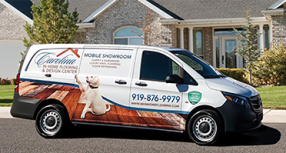Hardwood flooring has long been revered for its timeless beauty, durability, and the warmth it adds to any home. However, there's a common misconception that hardwood is impervious to water, leading many homeowners to wonder: Is hardwood flooring truly waterproof? Let's delve into this topic to uncover the truth about the water-resistant properties of hardwood.
Understanding the nature of hardwood
Hardwood flooring is made from natural wood, a porous material that can absorb and release moisture. The inherent structure of wood includes small openings or pores that allow it to breathe. While hardwood undergoes various treatments and finishes during manufacturing to enhance its resistance to moisture, it doesn't make it entirely waterproof.
Water resistance vs. waterproof
It's crucial to distinguish between water resistance and waterproof properties. A water-resistant material, like properly sealed hardwood, can withstand exposure to water for a short period without sustaining damage. However, it doesn't mean the material is impervious to water in the long run. True waterproof materials, on the other hand, completely repel water, preventing any absorption or damage.
Factors that impact water resistance
Sealing and Finishing: Enhancing Water Resistance
Manufacturers often apply sealants and finishes to hardwood flooring to enhance its resistance to water. Polyurethane and similar coatings create a protective layer on the surface of the wood, reducing its susceptibility to water damage. Regular maintenance, such as reapplying sealants as needed, is essential to keep the protective barrier intact.
The Importance of Timely Cleanup
Even with a water-resistant finish, it's crucial to promptly clean up any spills or standing water on hardwood floors. Prolonged exposure to moisture can lead to warping, cupping, or discoloration of the wood. Regularly checking for leaks and addressing them promptly is vital to prevent water damage.
Engineered Hardwood: A Water-Resistant Alternative
For areas in the home where water exposure is more likely, such as kitchens and bathrooms, homeowners may consider engineered hardwood as an alternative. Unlike solid hardwood, engineered hardwood consists of layers of wood pressed together with the top layer being a hardwood veneer. This construction provides greater stability and resistance to moisture.
Humidity Control: A Key Factor
The environmental conditions within a home play a significant role in the long-term performance of hardwood flooring. Fluctuations in humidity levels can cause wood to expand and contract, leading to gaps or warping. Maintaining a consistent indoor humidity level, typically between 35% and 55%, helps preserve the integrity of hardwood floors.
Contact Carolina In Home Flooring for expert advice
While hardwood flooring is not entirely waterproof, it can be water-resistant with proper finishes and maintenance. Understanding the limitations of hardwood in wet environments and taking preventive measures are crucial for preserving its beauty and longevity.
For homeowners in the Greater Raleigh, NC area looking to install or maintain hardwood flooring, it's essential to consult with experts. Carolina In Home Flooring offers a range of flooring solutions and professional advice to ensure your hardwood floors stand the test of time. Contact us today for personalized guidance and expert services tailored to your specific needs. With Carolina In Home Flooring, you can enjoy the timeless elegance of hardwood flooring while making informed choices to protect your investment.








